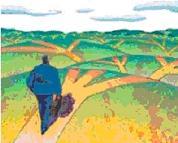
Home______Notes on Time & Choice: Daniel Dennett, Benjamin Libet, Roger Penrose, John Wheeler, & Advaita
Everything humanity thinks and believes about itself is predicated upon two concepts. One is free will; the other is self. Look wherever you will, whatever society you find, and all cultures contain a belief in some kind of will, and self. Civilizations, economies, legal systems, art, religion, all arise from them. But what if they are illusory?




